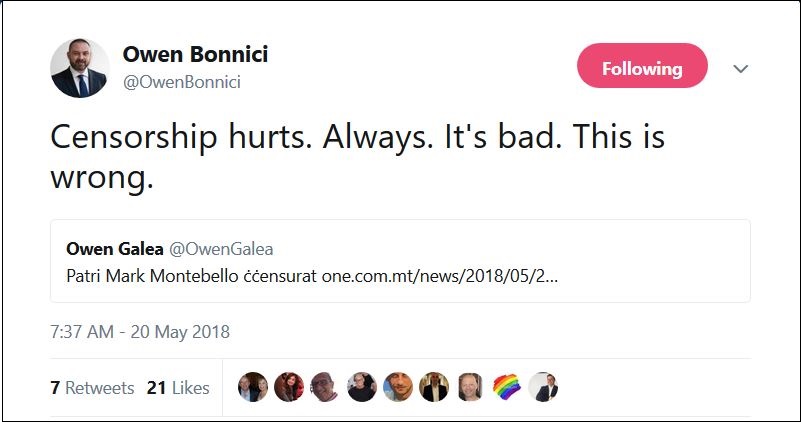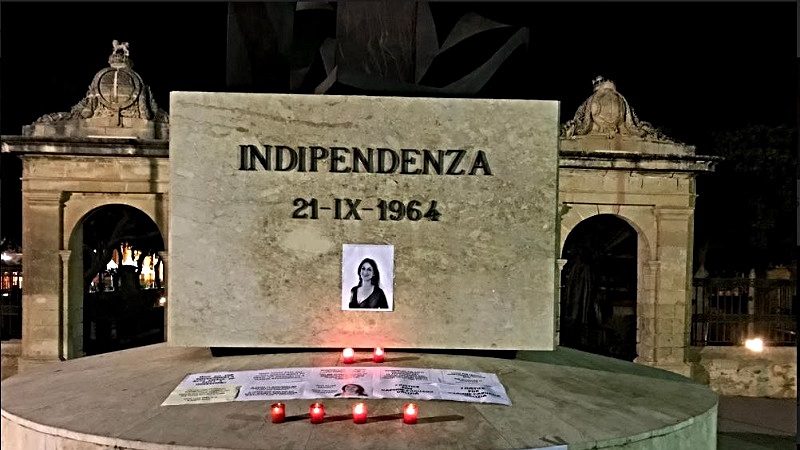At the risk of boring our long-suffering European dummy, this third instalment deals yet again with the issue of memorials, memory and, most specifically, the right to protest as enshrined in Article 11 of the European Convention of Human Rights.
Given that Malta is a European country, it should, in theory, abide by European rules which stipulate quite clearly that ‘you have a right to take part in peaceful protests and demonstrations and to join with others to achieve a particular goal.’
On 13 September, activists from Moviment Graffiti and Kamp Emerġenza Ambjent exerted this right during a meeting with the Planning Authority, renowned for giving permits to developers to construct Dubai-style towers on ODZ land (Outside Development Zone) reduced to barren plains as trees are cut down to enable wider roads on an island. Malta has a net average of 33 new vehicles a day and, in 2017, recorded the highest increase in CO2 emissions in the EU. Quite an accolade for its smallest nation state.
Not content with its Number 1 status, a plethora of petrol stations have been planned across this tiny island, with four applications already approved and 12 still pending. Some of these petrol stations are within walking distance of each other in land that once was fit for walking.
Protesters exerting their right to protest attended the Board meeting armed with non-threatening percussion instruments commonly known as drums. Nevertheless, the Rapid Intervention Unit (RIU) – to which, if you recall from Part 1, the police officer, Aldo Cassar, was sent as ‘punishment’ for tipping off the three suspects accused of assassinating journalist Daphne Caruana Galizia – was called in to deal with the non-violent protesters.
Obviously offended by the noise in a country which attains another 1st place rating as the noisiest country in the EU, the RIU used excessive force in removing the drum-wielding assailants, some being physically injured in the process.
Two days later, reassured by the words of Minister for Justice and Culture Owen Bonnici that he “will not censor anyone for expressing his thoughts”, activists from Occupy Justice and other groups arrived at the memorial in Republic Streets which, if you’ll remember from last week’s instalment, was hastily barricaded up during a formal wreath-laying ceremony to commemorate Victory Day. Such was their haste that the wreaths are still lying where they were left, behind the barricades.

The day before the 11 month anniversary of Caruana Galizia’s assassination, activists staged a peaceful protest placing a banner across the hoarding with a picture of the murdered journalist and the word ‘Ġustizzja’ (justice).
Flowers and candles were placed in front of this and leaflets were distributed to passers-by containing information on Article 41 of the Constitution of Malta on the right to freedom of expression.
You may be surprised to learn that some people were enraged and threw the document outlining their inalienable rights into the bin, itself a feat in a land deplete of such things, but nothing can prepare you for what’s to come.
Shortly after the protesters left, the police were called in to investigate the damage. Even these bastions of the State could find no cause for alarm as the passive items remained quietly acquiescent.
Infuriated by such insubordination within their own ranks, the Cleansing Services Department – yes, this DOES exist – was enlisted by the government, and a journalist was attacked while filming the dismantling of the makeshift memorial.
A group of protesters hastened to the police station whereupon their dissident belongings were returned and wheeled back round to the protest site where they were quickly restored.
Meanwhile the annual Gay Pride march made its merry way down Republic Street with some revellers pausing to hurl abuse at the murdered journalist.
Labour politicians were present during the festivities and the aforementioned Minister for Justice and Culture was spotted with rainbows on his face, the irony being that he gave the orders for the protest messages to be removed.
That same evening, a request for an emergency injunction signed by 62 lawyers on a Saturday night was refused, resulting in a group of activists keeping an all-night vigil to protect their protest – flowers, candles and a banner – from a ruthless assault by the government-controlled Cleansing Services Department.
In the wee small hours, police dropped by to notify the vigilantes that if the Cleansing Services Department came to clear the memorial then no resistance should be used because the objects would immediately be returned by the police.
Rumour has it that in the dark narrow streets of Valletta, the Cleansing Services Department was lurking ominously but scampered off like frightened rabbits at the mere whiff of a rose.
This is the right to protest in Malta.












